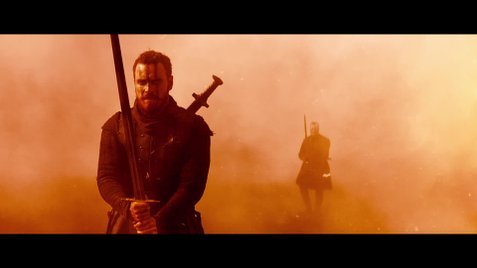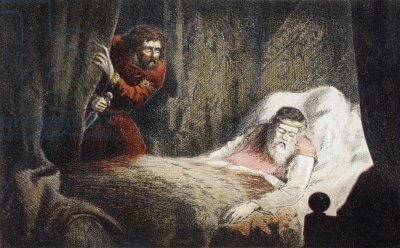Reading Shakespeare: Macbeth Act 2
Act 1 was exciting. The scene was set, a gloomy war-torn Scotland. The principal actors were introduced, the good King Duncan, his son Prince Malcolm, victorious Macbeth and his ambitious ice cold wife Lady Macbeth. Her first name is Gruoch if you were wondering, I had to look it up.
The main thrust of the play is revealed. Macbeth is ambitious, he wants more than just honors, he wants to be the king. His wife swears to stop at nothing to help her husband attain his desires. Act 1 ends with King Duncan and his crew spending a pleasant night at Macbeth's castle, unknown to them their honey tongued hosts have regicide on the mind.
Scene 1
SUMMARY: Act 2 starts off with Banquo and his son Fleance at Inverness castle whispering by torchlight while everybody else is sleeping. Banquo tells his son that he's been sleeping poorly, revealed later because he's been dreaming about the Witches and the prophecy.The conversation is interrupted when Macbeth stumbles upon them. Macbeth is of course about to commit regicide. Banquo tells Macbeth that King Duncan is very pleased with his reception and gives him a diamond meant for Lady Mcbeth as a reward for her loyal hospitality. After having a quick conversation Banquo and his son retire for the night leaving Macbeth by himself.
Macbeth dismisses all his servants and continues to make his way through the castle towards King Duncan's chamber when he is startled by an apparition. In front of him is a floating dagger that becomes clearer and clearer as he realizes that he must commit the murder. His vision or hallucination is interrupted by a chiming bell that is being used as the signal that it is time to kill Duncan.
Commentary: Banquo is a bit skeeved out by the prophecy, he mentions to his son that he would not sleep. Deep down I think that he knows something dark is about to go down and that suspicion increases once he comes across Macbeth creeping around in the middle of the night. The majority of their interaction is Banquo reminding Macbeth how appreciative Duncan is and gives him the gift of the diamond.
This scene is also the first of Macbeth's crazy visions, the bloody floating knife. I just don't understand why when he saw a bloody floating knife he didn't take that as a warning to not be a murdering bastard.
I also want to mention a meta element here. During Macbeth's floating knife speech he compares himself to Tarquin. This is a classical reference to Ancient Rome and the legendary Rape of Lucerne where king Tarquin raped the beautiful Lucerne sparking a civil war that eventually led to the creation of the Roman Republic. It's basically a reference to Roman creation mythology and interesting because it illustrates the level of classic education Shakespeare and his contemporaries must have had in order to understand such a reference. It's safe to say that most modern readers would not understand what he is talking about because the histories and classical studies are no longer a critical part of our education.
To make the above reference, even more meta, Shakespeare is also alluding to his own previous writing. One of his most famous long form poems is The Rape of Lucerne, so he is basically advertising himself in his own play. But, let's get more meta. I recognized the reference right away because I recently listened to a podcast on ancient pre-republican Roman mythology. I even tried to be smart and named a location in the short story I'm working on Tarquin's Manor for some obvious plot reasons.
Scene 2
Summary: Scene 2 starts with Lady Macbeth in the dark courtyard of the castle(or creeping around). She just drugged the milk and alcohol drinks of Duncan's guards and is not waiting for Macbeth to finish the murder.Macbeth wanders into the courtyard carrying the bloody daggers he just used to murder Duncan. He is spooked and hears voices and startles at every noise and snore from the castle. The two conspirators whisper and Lady Macbeth is upset that he brought the daggers. She takes them from him and goes to Duncan's chambers to place them on the sleeping guards in order to make them look like the murderers.
 When she returns Macbeth is freaked out and they start hearing a knock, most likely the morning bell ringer or castle guards making their rounds. She tells him to quickly go back to his chamber and change into his morning clothes so they appear to of just woken up.
When she returns Macbeth is freaked out and they start hearing a knock, most likely the morning bell ringer or castle guards making their rounds. She tells him to quickly go back to his chamber and change into his morning clothes so they appear to of just woken up.
Commentary: This is the post murder scene, an interesting murder from a dramatic perspective because it happens off screen. Duncan's murder is the catalyst of the whole play but we don't see it. We see the before and the after, yet the whole thing is very effective, we fill in the blank with our own imagination.
Personally, this is the scene where I started to despise Macbeth. He went from being a great warrior to a sniveling coward. He has ambition but no heart doesn't even have the balls to put his plans into words. It's his wife who pushes him, it's his wife who comes up with the plan, and after he finally murders a sleeping man, it's his wife who has to clean up the scene of the crime and frame the guards. Macbeth is a weak coward.
Scene 3
Summary: A drunk porter is joking about being a gateman in hell, sadly the gags don't translate well 400 years later. Macduff and Lennox, who were two of the Thanes at the beginning of the play just arrived at the castle. They walk in and are met by Macbeth who is dressed like he just woke up. Macduff goes to wake up the king while Lennox talks about the horrible night full of bad weather, spooky animals, and ill omens.Macduff returns shouting after discovering Duncan's murdered body. Bells of alarm are rung and the whole castle is woken. Banquo and the kings two sons Malcolm and Donalbain show up along with Lady Macbeth. In the chaos of the discovery, Macbeth quickly kills the two guards he framed. When questioned by Macduff he says that the sight of Duncan's body put him into a rage, but the scene is quickly interrupted by Lady Macbeth shouting for help as she is fainting.
The scene ends with Duncan's sons realizing that they are prime targets for being framed or murdered themselves so they decide to split. Malcolm runs off to England and Donalbain to Ireland.
Commentary: This scene is your basic sequel follow up if you know about the Scene and Sequel method of writing. There is a reaction, then a dilemma, followed by a decision. In this case we see the reaction stemming from the murder, the dilemmas are implied for different characters, and finally, Donalbain and Malcolm decide to get the hell out of Scotland.
Interesting to note is the supernatural element throughout the play is strong. The discussion about the weather being furious, filled with strange beasts and wild omens. All of this happening while the murder was being committed.
Scene 4
Summary: Sometime after the murder Ross another Thane is walking in the courtyard talking to an old man about the tragedy that befell Scotland due to Duncan's murder. The old man is listing ill omens such as night lasting longer, hawks dying, and all of Duncan's prized horses going wild and eating each other.Macduff joins them, just out of a council meeting. He informs them that the blame is being put on Duncan's sons and that Macbeth has been elected to become king. He lets Ross know that Duncan's body has been taken to Colmkill the resting place of Scottish kings and that Macbeth is already on the way to Scone where he will be crowned king. Ross asks Macduff if he will be going to Scone and he says no, he's heading home to his own castle at Fife.
Commentary: This scene is a closer and lets us know that everything has gone to hell through the words of the old man. Most importantly it hints that Macduff and Ross aren't buying the official story, most importantly Macduff skipping the coronation, most likely to get his boys ready for a throw down.
